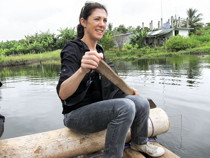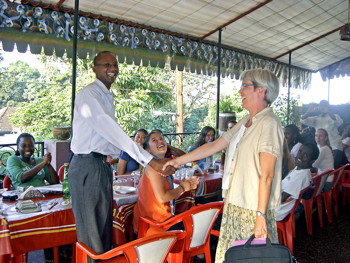COVER STORY
Action Teens, apples and the spirit of democracy: Cornell's culture of public engagement expands the definition of 'land grant'
Page 3 of 9 Academic rigor and good citizenship

Wendy Wolford See larger image
The historic collaboration between Cornell and CARE, established through gifts from David '60 and Pat Atkinson, will ensure "that the research will be scientifically sound and locally applicable," says professor Wendy Wolford, associate director for the field of economic development in Cornell's Atkinson Center for a Sustainable Future, which set up and administers the collaboration. For example, she says, "We have a team of CARE and Cornell researchers working together on a project to develop locally available fertilizers for agriculture in Ethiopia. … partnering with CARE will make it significantly easier to scale the project up from Ethiopia to Tanzania or Kenya. CARE has that kind of reach, and that's a pretty phenomenal opportunity."
Rebecca Stoltzfus, professor and director of the Program in International Nutrition in the College of Human Ecology and Cornell's provost's fellow for public engagement, is a prime candidate for participation in Atkinson Center efforts like the CARE collaboration. Her work centers on human nutrition, particularly for impoverished children.

In 2009, Stoltzfus congratulates Honest Massawe, the class representative from a collaborative global health and development course in Tanzania that enrolls both Cornell global health and Tanzanian medical students, as the rest of the class looks on. See larger image
Stoltzfus grew up Mennonite and attended Goshen College, a small Mennonite liberal arts school in Indiana. She majored in chemistry. After graduation she went to work for a biotech startup company, helping develop diagnostic tools for monitoring blood sugar and insulin levels.
"But it just didn't feel connected enough to the things I value in life," she says.
As a junior in college she'd spent what she calls a "transformative" semester in Hinche, Haiti, where she assisted in a research project aimed at improving milk yields in goats. "It was eye-opening," says Stoltzfus – not because of the goat breeding experiment (which bred the scrappy Haitian goats with larger, imported Alpine goats), but because of fundamental truths she witnessed as a guest in a Haitian family's home: "the lived realities and experiencing diversity and difference and the incredible joy and hospitality amongst people who were living in very difficult circumstances."
<<View entire story as one page>>
